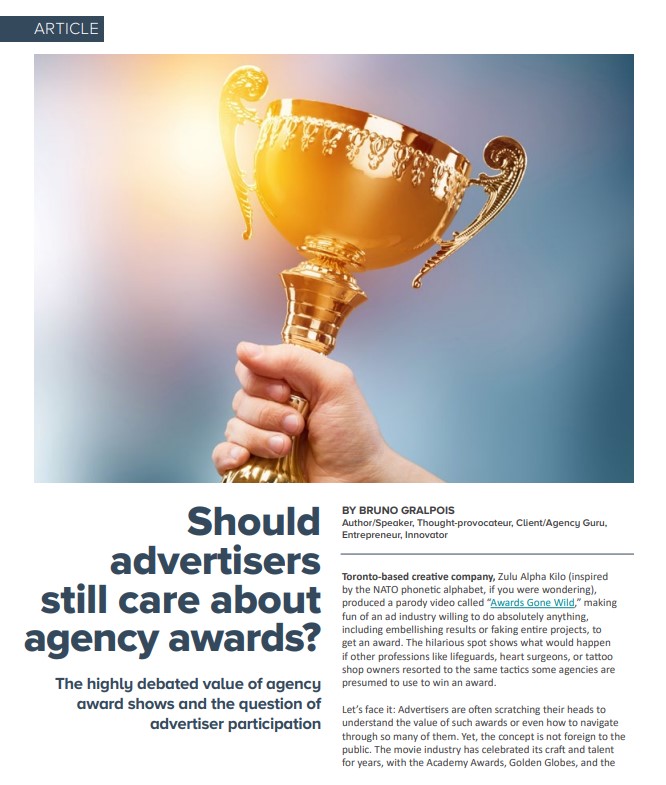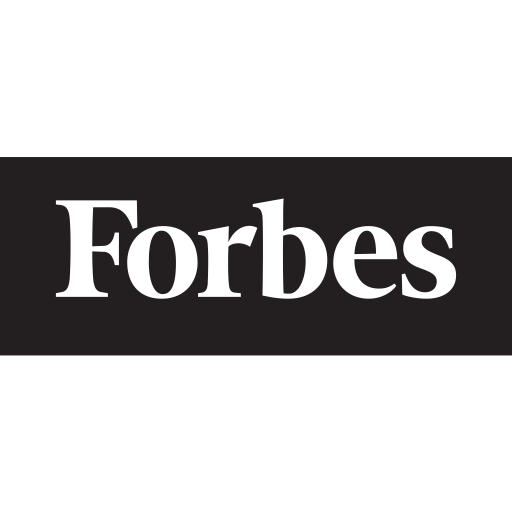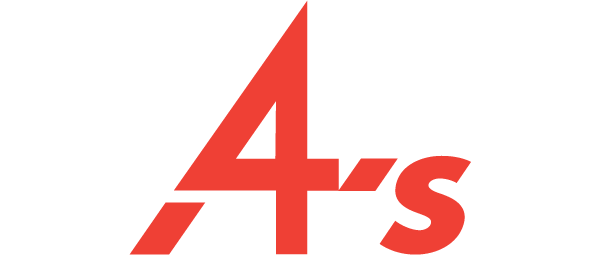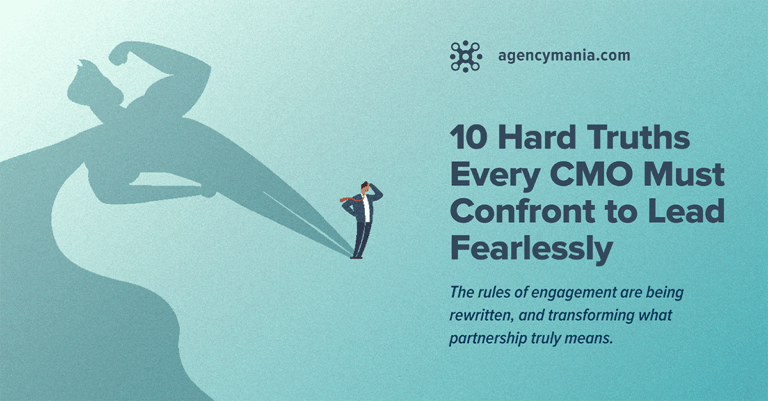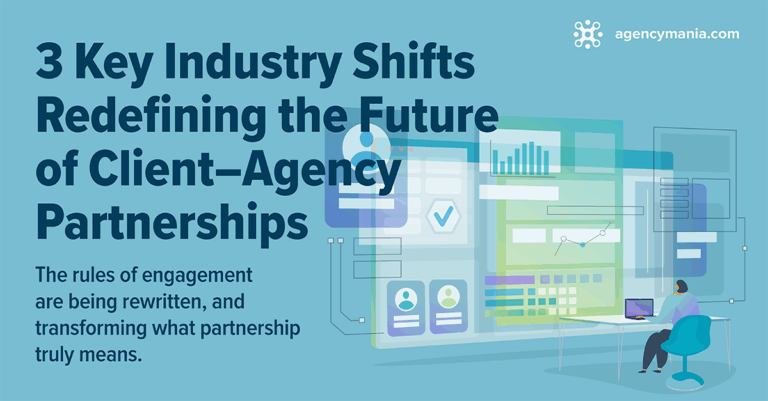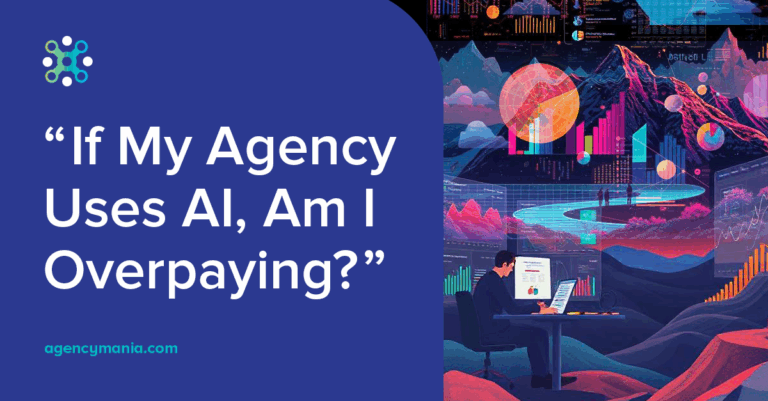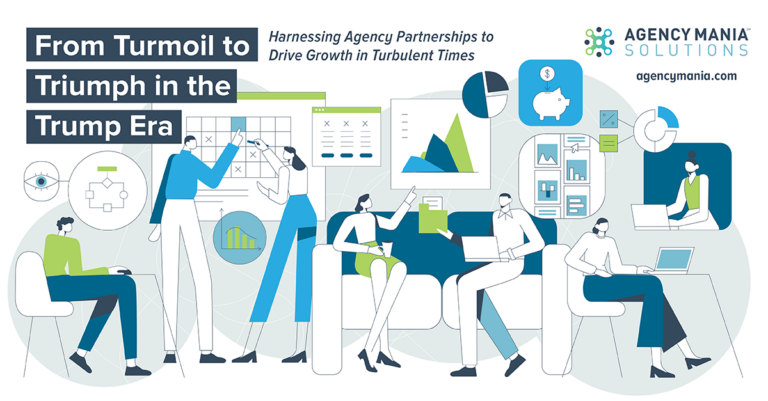The highly debated value of agency award shows and the question of advertiser participation.
— Read our article posted on Forbes —
— Read our article posted on 4As —
Toronto-based creative company, Zulu Alpha Kilo (inspired by the NATO phonetic alphabet, if you were wondering), produced a parody video called “Awards Gone Wild,” making fun of an ad industry willing to do absolutely anything, including embellishing results or faking entire projects, to get an award. The hilarious spot shows what would happen if other professions like lifeguards, heart surgeons, or tattoo shop owners resorted to the same tactics some agencies are presumed to use to win an award.
Let’s face it: Advertisers are often scratching their heads to understand the value of such awards or even how to navigate through so many of them. Yet, the concept is not foreign to the public. The movie industry has celebrated its craft and talent for years, with the Academy Awards, Golden Globes, and the Cannes Film Festival. The advertising industry has its prestigious event as well with the popular Cannes Lions International Festival of Creativity. However, there are many more award shows and events in advertising, adding much confusion among advertisers about their relevancy, the range and quality of competitive entries, and, in the end, their overall value.
Why does the industry care?
Although it’s entertaining to poke fun at the concept of awards, there is a reason they exist in the first place. Their purpose is to recognize, celebrate, and reward the best possible work in the industry. Unlike the movie industry and its credits, this may be the only public way to acknowledge the terrific people behind some of the brilliant work we see in our everyday lives.
For smaller, independent agencies with less share of voice in the marketplace, it’s a way to proudly promote innovative work they do and get noticed by prospecting brand advertisers. It’s no surprise that entries from independent agencies were up by 14% and production companies by 19% at the recent Cannes Lions International Festival of Creativity. More practically speaking, it’s a way for the industry to spot new talent, and for agencies to build a portfolio, get recognized by industry peers, reward teams and individual contributors, and build or accelerate careers (whether inside the agency or within a client organization), and come together to celebrate noteworthy achievements.
It comes at a cost, of course: sizeable entry fees and all the work (read “agency hours”) it takes to successfully submit a strong case study. Yet, agencies see enough value to invest their resources and manage to convince their clients to join them in that process. With far fewer opportunities to connect with each other in person during these tormenting COVID years, this type of celebration suddenly takes on a new and greater meaning for people and perhaps gives us a more acute sense of belonging.
Not all awards are equal
Awards have been around for quite a while. The Cannes Lions International Festival of Creativity has been bringing the creative communications industry together every year since 1954 to celebrate outstanding work. It does so across a wide range of categories (28 in total), and tracks include Craft (Digital, Design, Film, etc.) Experience (Creative, Innovation, Mobile, etc.), Engagement (Direct, Media, PR, Social and influencer, etc.), Strategy (Creative Strategy and Creative Effectiveness), Classic (Film, Outdoor, Print, Radio, etc.), and Health, Good, and Entertainment.
Every year, new categories are added (e.g., Creative B2B) or refined (e.g., Creative Commerce), reflecting new interests or competencies in the marketplace. In terms of sheer volume and participation, The Cannes Lions is considered the Oscars of advertising. In 2021, a staggering 29,074 pieces of work were entered from across 90 countries. But there are many other award shows established in specific geographic locations or by specialization that have relevant value based on where and how agencies and clients operate. Therefore, we put together this list of all of global major awards events.
Focusing on the right award
It wouldn’t make sense to compare a short film to a feature film at the Oscars. Similarly, it wouldn’t make sense to compare R/GA San Francisco’s “Superb Owl” for Reddit (Reddit’s first-ever Super Bowl ad), winner of the 2021 Lions Grand Prix in the Social and Influencer category with “Saylists” by Rothco, part of Accenture Interactive, Dublin, for Warner Music Group. The latter is a ground-breaking initiative using music and technology to augment the speech therapy experience for young people that won the 2021 Lions Grand Prix in the Creative Data category. It would be comparing apples and oranges. Different award shows have different focus and within a given award show, there are unique and distinct entries that address specific talents, geographies, and specialties.
Advertisers must decide if they want to participate, and if so, what level of investment they are willing to make: what shows they will enter, how many entries they will submit, how much time and effort they are willing to dedicate. This is a decision that should be made in concert with their agencies, which will have a strong point of view. Whether as a participant or as an observer, advertisers must seize this opportunity to understand what it took for a client and its agency to come together and create winning work. Often, bolder and riskier work pays off, but it takes a certain level of trust and collaboration to get there. Winning work might trigger some new ideas and energize their teams.
More good than bad
Effectiveness is increasingly taking center stage when evaluating work – no matter the type of work. Yet, there are several roadblocks: Hopefully, a qualified jury is reviewing and ranking entries, but we know that it is intrinsically subjective by nature. There is no validation process to ensure the accuracy of the data submitted. Not all agencies or clients are submitting work, resulting in a limited pool of work to choose from. And given the confidential nature of campaigns and their results, advertisers must decide how much they are willing to expose publicly to win an award, limiting judges’ ability to assess accurately and objectively. These are known limitations. But even the most vocal award detractors offer little in terms of alternatives to our industry. It’s fair to say that these awards provide some insight into current best practices or innovative thinking that agencies and advertisers put into their work. And in turn, they are often a source of inspiration. So, it seems that there is far more upside than downside to having quality venues where our industry can celebrate its greatness and its people.
By Bruno Gralpois, Author/Speaker, Thought-provocateur, Client/Agency Guru, Entrepreneur, Innovator
March 3, 2022

